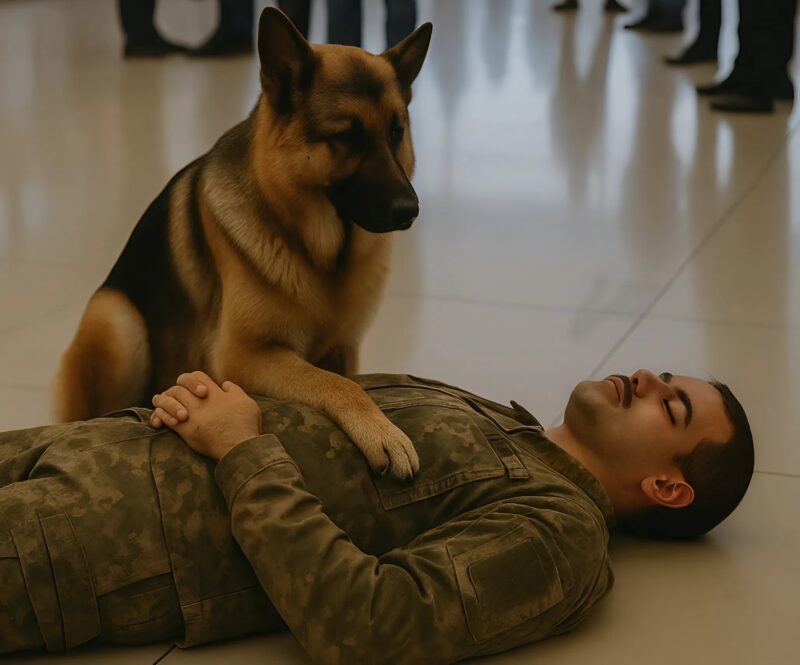Chicago O’Hare was bustling that morning.
The announcements overhead buzzed with gate changes. Children ran past the coffee lines, suitcases rolled and clattered, and the scent of airport bagels mixed with jet fuel in the air. Travelers came and went, most too busy to notice much around them.
But slowly, a crowd began to form in Terminal C.
It started with murmurs. Then people began to slow down, pointing toward the center of the terminal aisle. A few thought someone was filming a TikTok. Others assumed it was a medical emergency. But curiosity got the better of them.
There, on the cold tile floor near Gate C22, lay a young man in full military uniform. His camouflage jacket was neatly buttoned. His boots were laced. His pale face was pressed against his arm. His eyes were closed, unmoving.
Right beside him sat a German Shepherd.
Not just any dog—this one radiated discipline. She was large, with dark intelligent eyes and a powerful stance. She didn’t bark randomly. She didn’t fidget. But she watched. Every single person that stepped too close.
A woman in a red coat moved forward.
“Is he breathing?” she whispered, crouching down.
The dog rose. A low growl curled from her throat.
“Whoa,” the woman backed away.
A man nearby murmured, “Is he… okay? Should we call someone?”
“He might’ve passed out.”
“Heatstroke?”
“PTSD?”
Someone had already alerted airport security.
Two officers approached quickly. The Shepherd stood her ground. Her bark echoed off the high ceilings—sharp, commanding, not panicked. One step closer, and she placed her body between the soldier and the guards.
People began recording on their phones. The tension in the air was thick.
A TSA agent tried to calm the dog from a distance. “Easy, girl… It’s okay. We just want to help.”
The dog didn’t budge. She sat again, placing a paw gently on the soldier’s leg.
He still hadn’t moved.
Then, a teenager stepped forward. Not older than seventeen, holding his phone, clearly unsure of himself. He said quietly, “I think I know what’s happening.”
Everyone turned.
He walked closer—slowly, hands up to show no threat. The Shepherd growled, but he kept talking softly. “My brother’s in the Army. He told me about dogs like her. That’s not a pet. She’s a trained service dog.”
The guards exchanged glances.
“She’s doing what she was trained to do,” the boy continued. “She’s guarding him.”
“But from what?” someone asked.
“I think… from memories.”
There was silence.
And just as the guards were deciding whether to step in anyway, something shifted.
The Shepherd whined softly and nosed at the soldier’s shoulder.
Then—
A breath.
The soldier stirred.
He groaned slightly and opened his eyes.
The tension broke in an instant. The Shepherd immediately relaxed, tail wagging once, twice. She leaned down and licked the young man’s cheek gently.
The soldier blinked, confused by the people gathered around him. He slowly sat up, rubbing his eyes.
“Where… am I?”
The TSA agent knelt beside him. “Sir, you’re at O’Hare. Do you know what happened?”
The soldier looked down at his dog and smiled faintly. “I… I guess I fell asleep.”
“You were on the floor,” said a woman in the crowd. “We thought you passed out.”
The young man looked embarrassed. “No… no. I just…” He hesitated. “I have these episodes. Flashbacks. Mostly when I travel. My service dog—her name’s Echo—she stays close in case something happens.”
He patted the Shepherd’s head. She sat upright again, proudly, as if on cue.
“Is she trained to block people?” asked one of the security guards, now less wary.
He nodded. “If I black out or go into a panic attack, she’s supposed to protect me until I come to. She knows not to let anyone touch me until she sees I’m awake. It’s protocol.”
“She did her job,” murmured the teenager from before.
The soldier smiled at him. “Yeah. Better than anyone else ever has.”
A quiet chuckle rippled through the crowd, now visibly relieved. Phones were lowered. A few people even clapped, awkwardly, but genuinely.
The soldier stood slowly, Echo right at his side, her body brushing against his leg for support. A TSA agent offered him a bottle of water.
“Sorry for the disruption,” the soldier said, voice still hoarse. “I didn’t mean to scare anyone.”
“Don’t apologize,” said Miriam, the head of airport security, who had just arrived. “Your dog is a hero.”
He looked down at Echo. “She always is.”
—
Later, at the coffee shop, the soldier sat quietly with a hot drink, petting Echo’s fur rhythmically.
People passed him and nodded. A few whispered to each other.
The teen who’d spoken earlier approached again, hesitating.
“Can I ask something?”
The soldier nodded.
“Did it hurt?” the boy asked. “When you… served?”
The man paused. Then looked out the window at the planes taking off.
“Some of it. Yeah. But most of it comes later. When you’re trying to be normal again.”
The boy nodded. “You’re really brave.”
“Not as brave as her,” he replied, glancing down at Echo, who thumped her tail once and laid her head on his boot.
A soldier and a dog.
Two quiet survivors, watching the world move by—and reminding it to pay attention.
